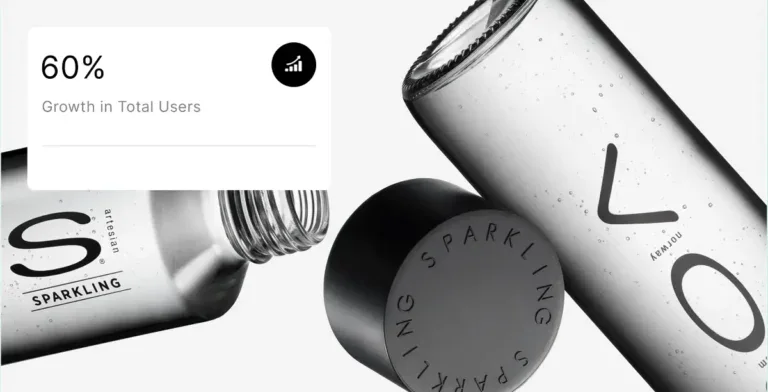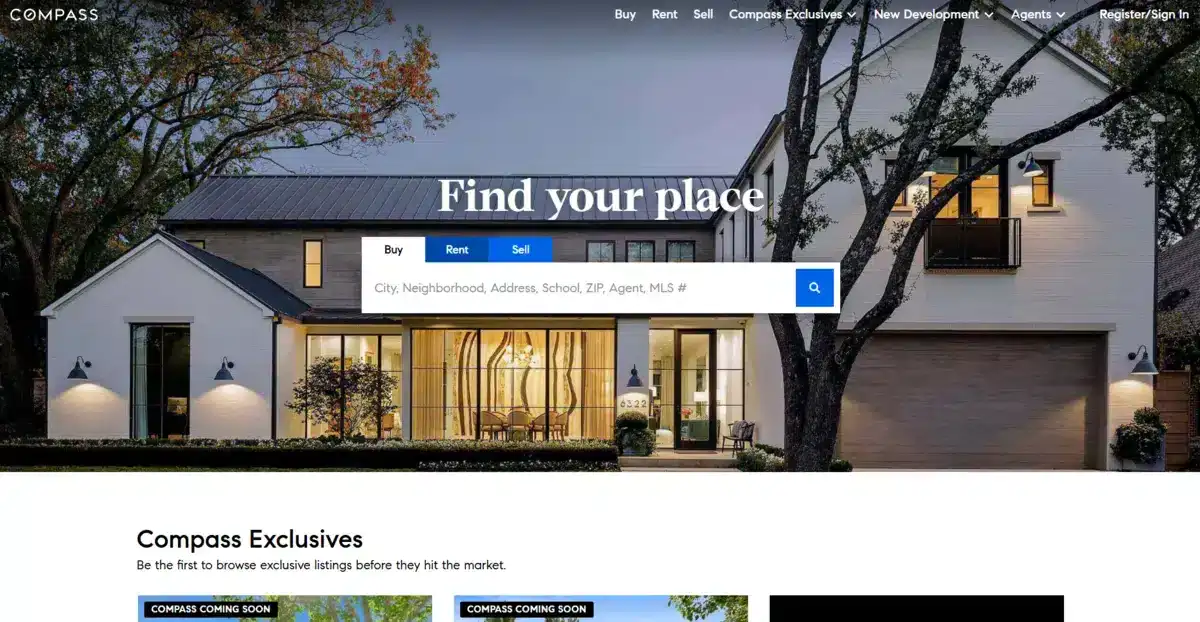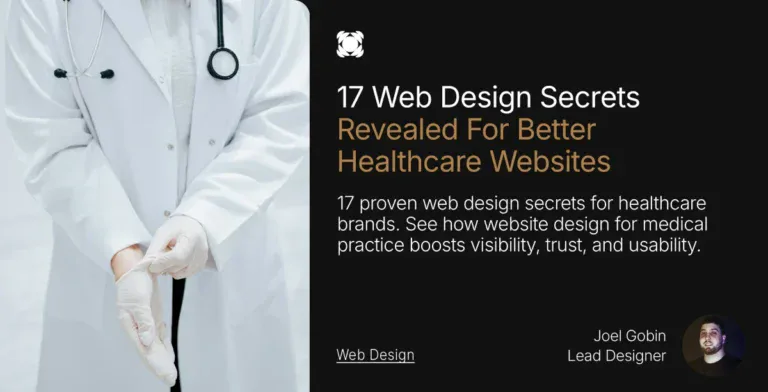Did you know that websites on the first page of Google capture 95% of web traffic?
That means that having a good website that looks good isn’t enough anymore. You need a website that looks good and performs just as well.

Creating and managing a website can seem like a daunting task, especially when every article and video makes it seem like a five-month process.
For property websites specifically, knowing that they need a website to showcase their properties is just the first step in their journey.
Every single property website out there uses a Content Management System (CMS for short). This software lets property owners create, edit, and manage the content they want on their websites.
When it comes to picking which CMS to use, there are a lot of different options you can go for. But today we are going to generalize them into two categories. Custom CMS and templates.
Below we’ll thoroughly compare custom CMS vs templates and show you which one is best for your property website and the pros and cons of each one.
Want to build a custom website for your real estate company but don’t know where to start? We can help you.
Custom CMS vs Templates: Pros & Cons For Property Websites

Now that we know exactly what each one offers, let’s go through what the standouts are from each and what is bad and not worth your time.
Custom CMS Pros
A Custom CMS has fantastic upsides that any real estate company would love to have for their first website.
Tailored Workflows: We provide you with custom content structures that align with the workflow of your internal team. Be it for managing portfolios, checking investor communications, or checking regional updates.
- Custom Branding: You can customize and include your branding even more than with a template. This is very important for luxury and investment-level firms where everything should look and feel high quality.
- Feature Flexibility: You can add and change features as you see fit. If you want a dynamic property map showcasing all of your current properties in real time, you can. If you find any plugin you feel like your website would benefit from, you can integrate it without any limitation.
- Performance Optimization: Custom and tidy codebases make for a fast-loading website with exceptional Lighthouse scores and impressive Core Web Vitals. This puts your website head and shoulders above slower websites that struggle to meet speed standards.
- Scalability: This is by far the best part of a custom CMS. Whether you plan on expanding towards new markets, a custom CMS will make it easier for you to create multiple micro websites without restrictions. You can also add the ability to provide complete multilingual support to a custom CMS. Being able to scale without any cap means that no matter how big your company gets, you will always be able to make your website keep up with it.
Custom CMS Cons
While having complete control over customization is amazing, a custom CMS also has some downsides that you have to consider before committing to one.
Expensive: Complete customizability comes at a cost. Expect to pay a large sum upfront just to start the project in the first place. This is without adding the extra costs, like added features, integrations, and much more.
- Long Project Period: Projects can take from 8 weeks to 24 weeks depending on the size of the website and all of the additions needed. This is without adding the extra work post-launch to ensure that everything is working as it should.
- Necessary Ongoing Support: Unless you have extensive knowledge of everything related to coding and CMS management, you will need the agency that created your custom CMS to work on your website every month. This is for both organizing and adding different content such as new properties you might have for sale or rent.
Template Pros
Templates offer great features and benefits that any business owner should consider when thinking about how to build their website.
Speed: Creating a good-looking website with a template is a lot faster and easier than using a custom CMS since most things are already prepared for you. This means that you can have your website up and running in less time.
- Cheaper: While creating a website and getting everything set up isn’t cheap by any means, the cost of a template is significantly lower than that of a custom CMS. If you’re on a tight budget, then it’s a great idea to choose a template.
- Ease of Use: A template CMS is significantly easier to manage and understand since it generally has a community of people explaining and guiding others. From videos to articles, you will find a solution to any problem you face with a template CMS.
- Plugin Ecosystem: No matter which template CMS you go for, there will always be a vast number of plugins to choose from that simplify and open up new ways to use your website.
Template Cons
While template websites have a lot going for them for companies with smaller budgets, it is hard to ignore the limitations they pose.
Not Much Flexibility: Customizing beyond what the template offers is pretty much impossible due to the CMS limitations that you have to abide by. This means that if you want to add something extremely specific that you can’t find as a plugin, then you’re out of luck.
- Lack of Uniqueness: While you can customize a template to look different from what it would look like when you started, it will still be easy to recognize a template if people look well enough. This is without adding the chance that the template you pick is popular and used for thousands of other websites. This would make it even more likely that someone notices that your brand is using a template and not a custom-made theme.
- Performance Issues: Templates generally come with bloated code and unnecessary scripts that severely slow down the speed of your website. This is without counting the plugins and extensions that will inevitably make the website a bit slower.
- Not as Many Integrations: While templates tend to have a lot of different integrations, they might be missing a core one you need for your website. Double-check that the plugins and integrations your website needs are available for the template you are picking.
- Hard to Scale: By far the biggest challenge you face with templates is the lack of scalability. Most templates have a page and extension limit that you have to abide by. Some don’t offer multilingual support, and adding complex page structures might not be available at all.
So What is Best For Property Websites?
Now that we have gone through both custom CSM and template pros and cons, we can start talking about which one is the best choice for you.
There is no one answer that fits all since property websites vary wildly depending on the size of the company and what they need to showcase specifically.
But for the most part, property websites require these essential website features as a bare minimum.
1. Advanced Search and Listing Tools
Every property website should have some sort of location-based filter for interactive maps. This makes it easy for visitors to browse properties and find the one they want.
Extra points if they can filter based on budget.
2. SEO and Performance Optimization
This is non-negotiable. You need a website that is well-optimized for SEO if you want to build a website that ranks.
Generally, a template will suffer from bad code and bloated content, which will lead to a slower website. You can optimize a custom CMS as much as possible for optimal lead generation and performance.
3. Real Estate Tech Integration
Real estate companies need a seamless data flow between platforms, which means that checking that a template works with the platform they use is vital.
Custom CMS can get a CRM tailored for them, which saves them the hassle of having to find something like Salesforce.
4. Content Strategy
Creating content for a website is fairly similar for both a custom CMS and a template website, with the biggest change being that a custom CMS can make it look better and more in line with the style of the company itself.
5. Security and Compliance
This is a must. Every property website, regardless of whether it uses a custom CMS or a template, must have both ADA and GDPR compliance.
Custom CMSs have the ability to make the website as accessible as possible to ensure they are ADA compliant.
Templates, on the other hand, can face issues if the template isn’t accessible enough.
Let’s quickly go through each of the options below.
What is a Custom CMS?
As the name suggests, a custom CMS is a Content Management System tailored to your real estate company.
With a custom CMS, you won’t have to settle for anything. You can get features you might like from different CMSs and add them into one.
This means that you can create a custom CMS customized for your company and its needs.
Do you want a section that helps you navigate and keep tabs on investors and potential tenants?
A custom CMS can do that.
Instead of having to deal with extensions and plugins that sometimes have compatibility issues or completely break, you can have everything you need within your CMS.
For the most part, developers create custom CMSs with programs such as Django, React, and Laravel. Although recently, there has been a surge of headless CMS tools like Sanity, Contentful, and Strapi.
Headless CMSs are easier to customize after everything is set. This means any modification you need on your website months after it is set up won’t take that long to do.
What are Templates?
CMS templates are your common CMS services offered by big companies such as WordPress, Drupal, Webflow, and more. These templates come with plenty of features that help most companies bring their ideas directly to a website.
Any extra features or ideas you want to add would need to be through extensions or plugins.
That being said, you will encounter moments when you need a very niche thing for your website, and no extensions will fit your needs.
This is without adding the cost of certain extensions and plugins.
Some have an upfront cost, and some will ask for a monthly fee to access everything they have. This can become expensive if you need several extensions to make your website do everything you need it to do.
Explore how we redesigned HPI Real Estate’s website and created a scalable and modular property listing for easier viewing.
Who Should Pick Custom CMS?
Real estate companies that have several established locations need a robust website that can handle complex maps and systems.
While templates can possibly work in this scenario, at some point they will run into scalability issues.
If your property website needs hundreds of different pages to accommodate all of your properties, then a custom CMS is a no-brainer.
Not only will you be able to scale it as your business keeps growing, but it will offer everything you need.
Who Should Pick Templates?
Real estate agencies that need a quick and simple website without breaking the bank can pick templates.
If your real estate agency just started or has very few properties, then a template can definitely work.
A template is also excellent if you need a website up and running as soon as possible. You can have your website set up with a template in as little as a week if you know what you’re doing.
Custom CMS Examples of Real Estate Agencies
Below we’ll go over three of the best-looking and optimized property websites from popular real estate agencies all over the world.
This is in no particular order.
1. Compass
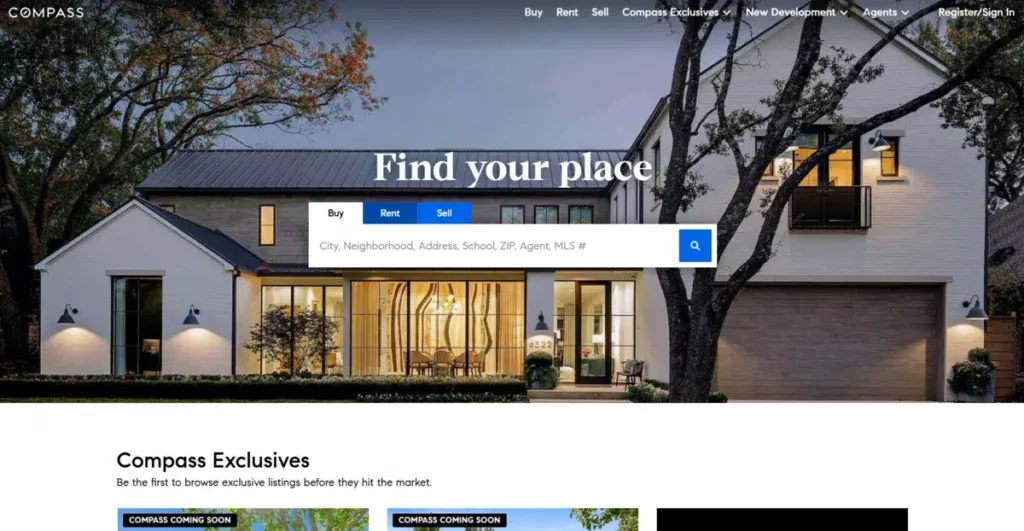
Compass is a professional real estate agency with a fabulous and easy-to-use website that is easy to navigate and understand.
As soon as you enter, you’re greeted with a search bar that helps you find the perfect place for you based on your location. This is perfect for visitors who want to get straight to the point or who get easily distracted.
Going to other pages on their website lets you notice that they stick to a theme no matter what.
2. Anywhere Advisors
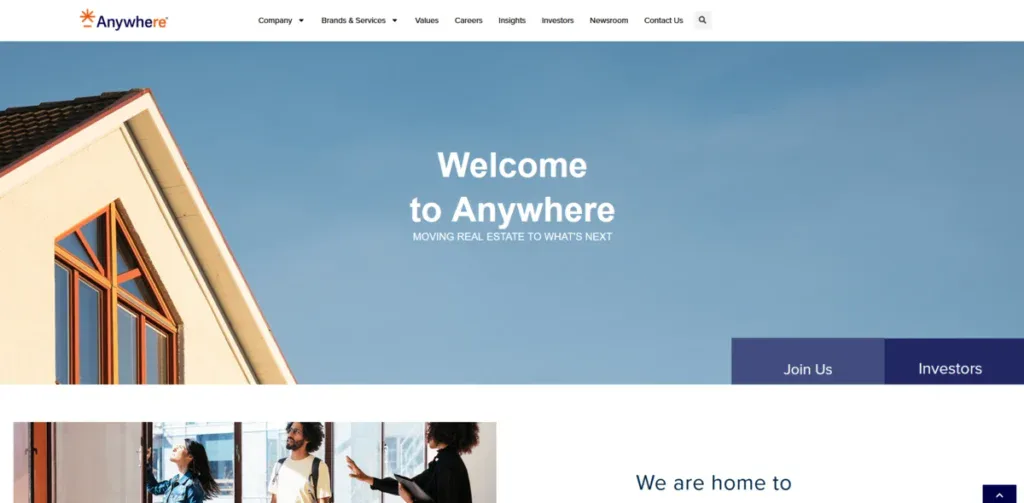
Anywhere Advisors have a great website that helps visitors find the exact service they are looking for in a quick and easy way.
Their high-converting homepage is a great example of what to do for your own website.
An extremely fast-loading website accompanies this and doesn’t waste your time at all.
This makes it easy to browse and learn more about the agency and what it can do for you.
3. eXp Realty

eXp Realty shows us that less is more when it comes to property websites. As soon as you enter, you’re met with a high-quality video that shows you how they work and how they can help you.
As you scroll down, you instantly discover houses for sale close to your location to help you get started.
This saves visitors the time of having to put in their address and instead gives them exactly what they are looking for without having to do anything.
4. Gallelli
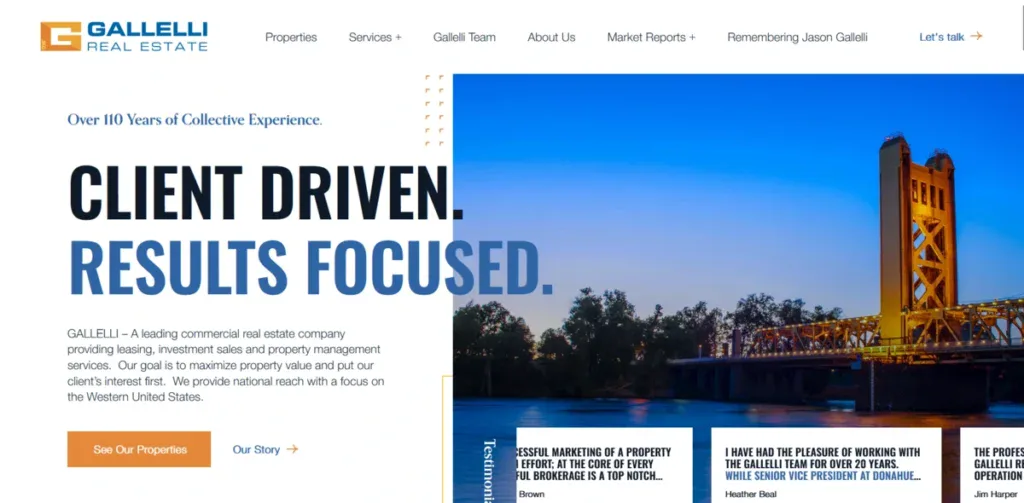
Gallelli has a great and modern property website that helps investors know what they can do for them.
The website design helps keep visitors interested by using good colors and smart copywriting placement.
From their homepage, you get to learn more about the real estate company, how experienced they are, and how much they can do for you if you work with them.
Learn how we completely redesigned Gallelli’s website to improve user engagement and conversions.
Get a Custom Property Website that Converts with Blacksmith
So we just went through a comprehensive comparison between custom CMS vs templates and explained to you which type of real estate agency would benefit the most from each one.
So this might have made you want to create a website of your own or update an existing one for your real estate agency.
But you might have also noticed that creating a new website from scratch can be a daunting and complicated process.
So what now?
That’s where we come in. Here at Blacksmith, we are property website experts with dozens of different custom websites created.
As a professional web development company, we have a group of seasoned web developers ready to take your property website to a whole new level.
They’ll ensure that your website stands out from the competition while helping you close deals with easy-to-use interactive maps for visitors.
Unsure if a new custom website is what your real estate agency needs to get to that next level? Don’t worry, click here to schedule a call with us and we will provide you with a complete brand and website audit.
This way we can show you where you are potentially losing clients, how you compare to your competitors, and what we can do to make sure your website looks its best.

